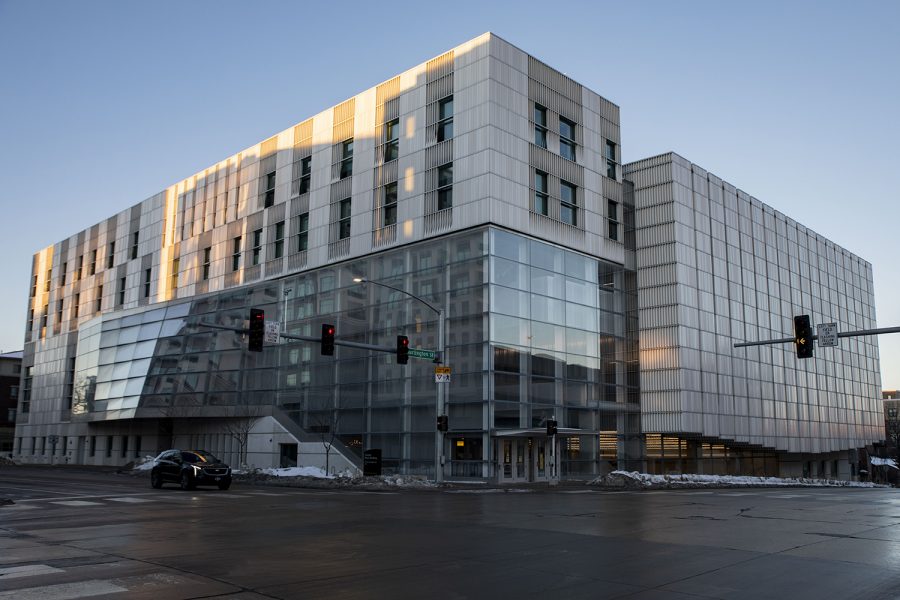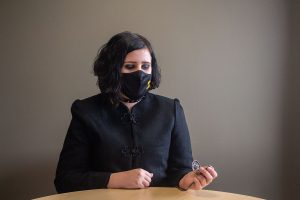School of Music to respond to social injustice with creative performance
Tonight, the University of Iowa School of Music will present a unique set of artistic performances in response to 2020’s events of social injustice.
The Voxman Music Building is seen on Monday, Feb. 23, 2021.
February 25, 2021
Tonight, the School of Music will bring a unique and creative look at how American society handles situations of racial injustice and inequality through an all-virtual performance.
Titled “Face Self / Face Truth: Creative Arts in Response to Social Injustice,” the University of Iowa School of Music will present an online, multidisciplinary performance at 5:30 p.m., in response to the social unrest of 2020. The event was initially conceptualized after George Floyd’s murder in May of 2020, and the injustice that followed.
A variety of artists will perform including several UI students, along with a few local professional performers as well. The pre-recorded performances will showcase a diverse range of artistic mediums, including spoken word, hip-hop music and dance, gospel singing, jazz, and classical music.
Each performance will be paired with images or videos of violent acts being committed against African American and Black individuals, with some being from history and some more recent. In combination with the artistic performances, these visuals are meant to inspire and implore the audience to better understand and reflect upon their personal relationship with racial injustice.
Though it was originally created and primarily organized by Director of Jazz Studies and Associate Professor of African American Studies Damani Phillips, there were a few students who also assisted in the event’s organization. One of these students is senior Cole Peterson, who is majoring in jazz studies. Peterson wrote that after seeing what the videos and images will display, the event will hopefully compel those who view it to take time to think deeply about what they can do to address these societal problems.
“I think that a lot of white Americans have the luxury of not thinking about these things if it gets too uncomfortable for them to think about,” Peterson wrote in an email to The Daily Iowan. “Hopefully this project will make them really deal with it head on.”
RELATED: UI School of Music addresses lack of diversity in classical music, steps to improve
These feelings are similar among students performing in the program as well, including Giauna Neville, who is a second-year MFA student and teaching assistant for jazz studies, specializing in percussion. Neville is involved in three different segments of the program and will provide jazz and hip-hop oriented music alongside her colleagues. She said she believes the event will enable people to face the truth of what has been happening and continues to happen daily in the realm of racial injustice and police brutality.
“I think pairing the visual elements with the music will give the person a little more life than just pictures or a hashtag,” Neville said. “I think people who view this program will have a different perspective of these people who have had their lives taken.”
Another student to perform is Talia Howard, a sophomore majoring in dance and enterprise leadership with a minor in American Sign Language. Howard will give a solo dance performance alongside a gospel trio singing “My Life, My Love, My All” by Kirk Franklin. Howard said she believes that her performance, paired with the graphic visuals, will shine an important spotlight on the abundance of traumatic historical events, and bring Black History Month to an honorable close.
“The images shown are not pleasing images to see, but they are images that need to be remembered,” Howard said.
She went on to describe why she wanted to be personally involved in the program, stating that she did not see enough awareness of the mistreatment of Black people at the UI, and wants to see more education, understanding and reflection around campus, of not only the trauma inflicted upon the Black community but all minority communities.
“It is time for people to truly sit and understand the past, and also the now,” Howard said. “This is the only way to grow, heal, and create a more inclusive future.”





